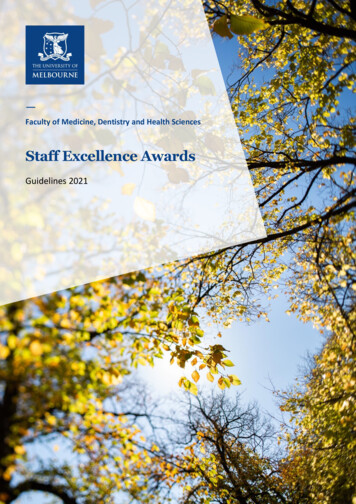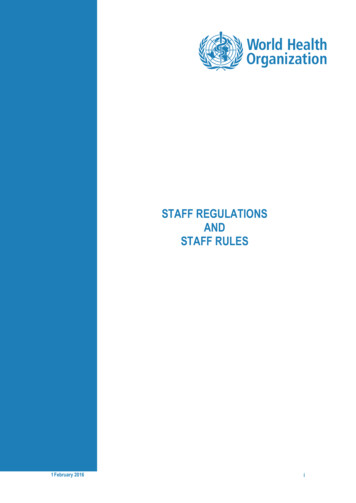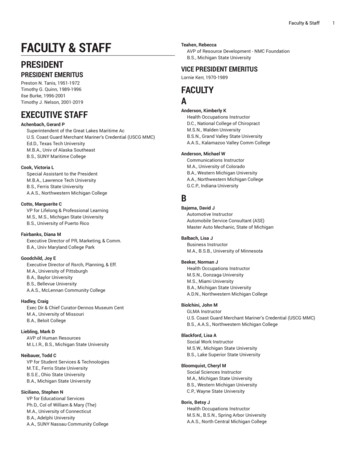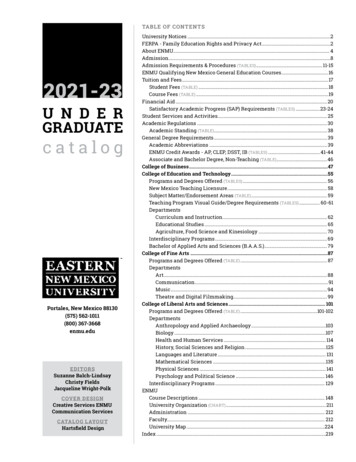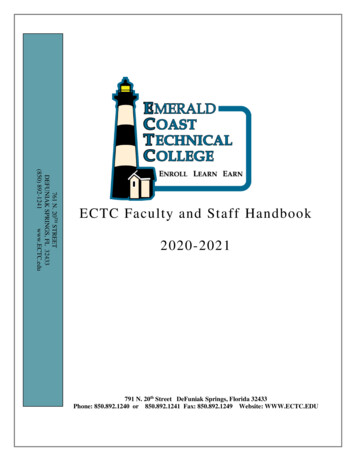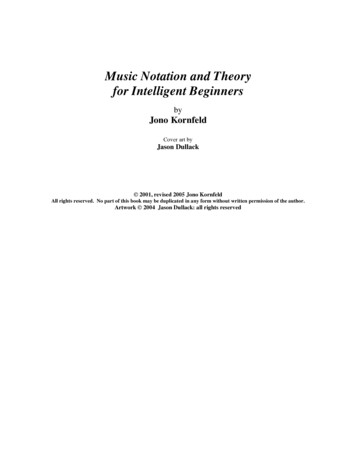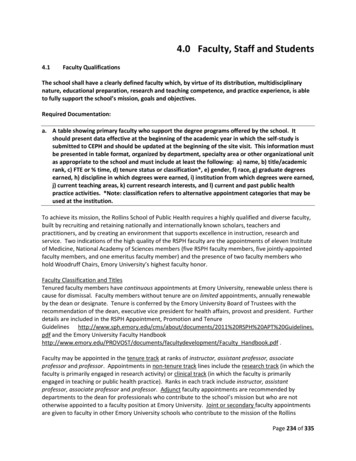
Transcription
4.0 Faculty, Staff and Students4.1Faculty QualificationsThe school shall have a clearly defined faculty which, by virtue of its distribution, multidisciplinarynature, educational preparation, research and teaching competence, and practice experience, is ableto fully support the school’s mission, goals and objectives.Required Documentation:a. A table showing primary faculty who support the degree programs offered by the school. Itshould present data effective at the beginning of the academic year in which the self-study issubmitted to CEPH and should be updated at the beginning of the site visit. This information mustbe presented in table format, organized by department, specialty area or other organizational unitas appropriate to the school and must include at least the following: a) name, b) title/academicrank, c) FTE or % time, d) tenure status or classification*, e) gender, f) race, g) graduate degreesearned, h) discipline in which degrees were earned, i) institution from which degrees were earned,j) current teaching areas, k) current research interests, and l) current and past public healthpractice activities. *Note: classification refers to alternative appointment categories that may beused at the institution.To achieve its mission, the Rollins School of Public Health requires a highly qualified and diverse faculty,built by recruiting and retaining nationally and internationally known scholars, teachers andpractitioners, and by creating an environment that supports excellence in instruction, research andservice. Two indications of the high quality of the RSPH faculty are the appointments of eleven Instituteof Medicine, National Academy of Sciences members (five RSPH faculty members, five jointly-appointedfaculty members, and one emeritus faculty member) and the presence of two faculty members whohold Woodruff Chairs, Emory University’s highest faculty honor.Faculty Classification and TitlesTenured faculty members have continuous appointments at Emory University, renewable unless there iscause for dismissal. Faculty members without tenure are on limited appointments, annually renewableby the dean or designate. Tenure is conferred by the Emory University Board of Trustees with therecommendation of the dean, executive vice president for health affairs, provost and president. Furtherdetails are included in the RSPH Appointment, Promotion and TenureGuidelines 20RSPH%20APT%20Guidelines.pdf and the Emory University Faculty ultydevelopment/Faculty Handbook.pdf .Faculty may be appointed in the tenure track at ranks of instructor, assistant professor, associateprofessor and professor. Appointments in non-tenure track lines include the research track (in which thefaculty is primarily engaged in research activity) or clinical track (in which the faculty is primarilyengaged in teaching or public health practice). Ranks in each track include instructor, assistantprofessor, associate professor and professor. Adjunct faculty appointments are recommended bydepartments to the dean for professionals who contribute to the school’s mission but who are nototherwise appointed to a faculty position at Emory University. Joint or secondary faculty appointmentsare given to faculty in other Emory University schools who contribute to the mission of the RollinsPage 234 of 335
School of Public Health. Affiliated faculty are appointed to centers or units because they contribute tothe mission of those particular programs.Definition of Core FacultyThe RSPH defines a core faculty member (tenure-track or nontenure-track) as a member who has aprimary appointment of 0.8 FTE or greater in the RSPH and supports the teaching program (i.e., thosewho teach, as well as those who mentor students or who provide academic advisement to studentsabout thesis, SSP, directed studies, dissertation, or practicum). Full-time faculty appointed to tenuretrack positions are expected to participate in the school’s degree programs, conduct sponsored researchand participate in professional and public health service activities.Faculty FTEs are attributed to the departments in which they hold a primary appointment. The CareerMPH (CMPH) program draws on the faculty resources throughout the school, so the FTE of core facultyteaching for the CMPH program have been included in the department to which they are appointed.(For specific calculations on CMPH faulty, see Criteria 2.12)Table 4.1a, which follows, includes the list of all core faculty supporting the instructional programs as ofNovember 1, 2010. It should be noted that FTE of faculty listed in this table are the FTE assigned in thehuman resources database (and include two faculty who support the research program, but not theinstructional program), so the FTE totals here will be slightly different than in Table 1.6e, where FTE ofCore faculty 0.80 FTE or more were counted as 1.00 FTE and research faculty were not included.Page 235 of 335
Table 4.1a: Faculty who Support Degree Offerings of the School as of November 2011 (CORE FACULTY)Gray shaded rows indicate faculty who supported the research program, but not the instructional program in 2010-2011.NameBehavioral Sciences and Health Education (BSHE) DepartmentGenderRace orGraduateInstitutionDiscipline inEthnicityDegreeswherewhich degreesEarneddegreeswere earnedwereearnedFWHITEMPHEmoryHealth PromotionUniversityand EducationTitle/AcademicRankTenurestatus orclassificationFTEor %TimeTeaching AreaResearch ck1.00Technology Tools;QuestionnaireDesign and Analysis;Health Education &ComputersChronic Diseases;Health PsychologyTraining;WorkforceDevelopmentBerg, ity ofKansas;University , ITEPhDUniversity ofRhodeIslandPsychologyTraining; TechnicalAssistanceChae, HuiWoong logyBehavioral ResearchMethods; Race andHealthCooper,Hannah arvard SPHHealth and SocialBehavior;Health and SocialBehaviorMacrosocialDeterminants ofHealth; QualitativeResearch MethodsPublic Health;Cancer Prevention;Health Disparities;Multiple HealthRisk Behavior;Tobacco Control;Young Adults andAdolescents;PositivePsychologyPublic t;EvaluationBehavior andHealth;DiseaseSurveillance;Health Outcomes;Mental Health;CardiovascularDiseaseAddiction/DrugAbuse Prevention;Behavior andHealth;HIV/AIDSPage 236 of 335
Table 4.1a: Faculty who Support Degree Offerings of the School as of November 2011 (CORE FACULTY)Gray shaded rows indicate faculty who supported the research program, but not the instructional program in 2010-2011.NameBehavioral Sciences and Health Education (BSHE) DepartmentGenderRace orGraduateInstitutionDiscipline inEthnicityDegreeswherewhich degreesEarneddegreeswere rsity;Sciences andGeorgiaHealth versity enurestatus orclassificationFTEor %TimeTeaching AreaResearch InterestDePadilla,Lara tiveAnalysisHIV/AIDS;Sexual Behavior;StatisticalModelingDiclemente,Ralph JosephProfessorTenure1.00Adolescent HealthPromotion;Grantwriting/Research Ethics;Approaches toHealth PromotionHIV/STDPrevention;Adolescents andHIVDiIorio,Colleen AnnProfessorTenure1.00FWHITEPhDMSNew YorkUniversity;New asurement;Health BehaviorTheory; ProgramPlanning; ResearchDesignHealth Promotion;Health Behavior;BehavioralChange:adherence/selfmanagement andHIV ITEPhDMPHUniversity ofMichigan;University thSexual Health inGlobal and SocialContext; HIV/AIDS;AIDS Public HealthImplicationsBehavior andHealth;Global Health;HIV/AIDS;Maternal and ChildHealth; SexualBehaviorElifson, gy;SociologyQualitative ResearchMethods;Multivariate DataAnalysis; Researchmethodology;StatisticsReligion; Deviance;AIDS/HIV; SocialBehavior;QuantitativeStudiesPage 237 of 335
Table 4.1a: Faculty who Support Degree Offerings of the School as of November 2011 (CORE FACULTY)Gray shaded rows indicate faculty who supported the research program, but not the instructional program in 2010-2011.NameBehavioral Sciences and Health Education (BSHE) DepartmentGenderRace orGraduateInstitutionDiscipline inEthnicityDegreeswherewhich degreesEarneddegreeswere earnedwereearnedFASIANPhDUniversity of Health PromotionMPHGeorgia;& Behavior;EmoryHealth PromotionUniversityand EducationTitle/AcademicRankTenurestatus orclassificationFTEor %TimeEscoffery,Ngoc-Cam ateNontenuretrack1.00FWHITEEdDMEdUniversity ofGeorgia;University ofGeorgiaJacob Arriola,Kimberly UniversityUniversity ofNorthCarolina;University ofMichiganTeaching AreaResearch InterestBehavioral Sciencesand HealthEducation Theories;Community NeedsAssessment;Research Design andGrant Preparation;Program PlanningCancer Prevention;Evaluation;Health Promotion;SmokingPrevention/CessationAdult Education;Adult EducationCurriculum andInstruction in HealthEducation;EvaluationHIV/AIDSSocial Psychology;Epidemiology;Social PsychologyBehavioral ResearchMethods; HealthPromotionInterventionsOrgan and tissuedonation; programevaluation; breastcancer educationand screeningHealth Behavior &Health Education;Health Behavior &Health EducationHealth PromotionInterventions;Evaluation;Community NeedsAssessmentCancer Prevention;Community BasedResearch;Evaluation;Health ationPage 238 of 335
Table 4.1a: Faculty who Support Degree Offerings of the School as of November 2011 (CORE FACULTY)Gray shaded rows indicate faculty who supported the research program, but not the instructional program in 2010-2011.Behavioral Sciences and Health Education (BSHE) DepartmentGenderRace orGraduateInstitutionDiscipline inEthnicityDegreeswherewhich degreesEarneddegreeswere earnedwereearnedFWHITEPhDLoma LindaClinicalMPHUniversity;Psychology;MALoma eTitle/AcademicRankTenurestatus orclassificationFTEor %TimeTeaching AreaResearch InterestLang, y Methods;Grant Writing;QuantitativeAnalysis; Theory inBehavioral Science;Research Methodsin n's Health; GenderBased Violence;InternationalResearchLevinson,Richard rsity ofWisconsin;University ofWisconsinSociology;SociologySocial Behavior inPublic alth Education;Science EducationEmoryUniversityBehavioralScience & HealthEducationTeaching in PublicHealth; HealthEducationCurriculum andInstruction;Introduction toBehavioral Sciences;Research Methods;EvaluationTraining: TechnicalAssistanceSocialdeterminants ofhealth riskbehavior; accessto and utilizationof health servicesPublic HealthWorkforceTraining/Development; Evaluation;EmergencyPreparednessMiner,Kathleen DMPHMEdMorris, KMPHPublic HealthTraining andProgramDevelopment;Health Promotion:TobaccoPrevention andControl; Nutritionand FitnessPage 239 of 335
Table 4.1a: Faculty who Support Degree Offerings of the School as of November 2011 (CORE FACULTY)Gray shaded rows indicate faculty who supported the research program, but not the instructional program in 2010-2011.NameBehavioral Sciences and Health Education (BSHE) DepartmentGenderRace orGraduateInstitutionDiscipline inEthnicityDegreeswherewhich degreesEarneddegreeswere earnedwereearnedMWHITEPhDIndianaHealth Behavior;MSUniversity;CommunityBall StateHealth gyStateUniversityTitle/AcademicRankTenurestatus orclassificationFTEor %TimeTeaching AreaResearch InterestNehl, EricAsstResearchProfNontenuretrack1.00Theory in BehavioralSciences and HealthEducationHIV/STIsSalazar, LauraFAsstResearchProfNontenuretrack1.00Behavioral Sciencein Public Health;Theories ofBehavioral Scienceand HealthEducation; AppliedResearch MethodsEvaluation;AdolescentHealth/Child HealthSTD/HIVPrevention andControl;Adolescent Health;Violence AgainstWomen; ProgramEvaluationSTD/HIVPrevention; SexualBehavior; Genderbased Violence;AdolescentHealth/ChildHealthSales, hDMAEmoryUniversity;EmoryUniversityCognitive andDevelopmentalPsychology;Cognitive andDevelopmentalPsychologySterk, ClaireElizabethSr Univ ofRotterdam/City U ofNew York;University ofUtrechtSociology;MedicalAnthropologySubstance Abuse;Qualitative ResearchMethodsDevelopmentalPsychology onal ion/mentalhealth; HIV/AIDS,Women's issues;Health Administrationand financialaccounting;operationsmanagementSurbey, PaulDeanExecAssocDean, Fin& AdminNontenuretrack1.00MWHITEMAMBAUniversity ofMinnesotaUniversity ofMinnesotaSwan, SGeorgiaState Univ.GeorgiaResearch Design andAnalysis;QuantitativeChild Health andEducation;MethodologyPage 240 of 335
Table 4.1a: Faculty who Support Degree Offerings of the School as of November 2011 (CORE FACULTY)Gray shaded rows indicate faculty who supported the research program, but not the instructional program in 2010-2011.NameTitle/AcademicRankTenurestatus orclassificationFTEor %TimeBehavioral Sciences and Health Education (BSHE) DepartmentGenderRace orGraduateInstitutionDiscipline inEthnicityDegreeswherewhich degreesEarneddegreeswere earnedwereearnedState Univ.PsychologyTalley, Colin niv of CA,San Fran;Univ of CA,San Fran;San DiegoState UnivHistory HealthSciences;History HealthSciences;HistoryThompson,Nancy niversity;EmoryUniversityClinicalPsychology;Public enuretrack0.96FBLACKPhDMSWUniversity ofSouthCarolina;University ofGeorgiaHealthPromotion,Education andBehavior;Social WorkWindle,MichaelTerrenceProfessorAnd ChairTenure1.00MWHITEPhDMAPenn State;SouthernIllinoisUniversityHumanDevelopment andFamily Studies;ClinicalPsychologyTeaching AreaMethods andAnalysisBehavioralSciences/PublicHealth; SocialBehavior in PublicHealth; LGBTQPublic Health;History of search;Mindfulness; PublicMental Health;Teaching in PublicHealthCommunity NeedsAssessment; HealthEducationHealth Promotion;ProposalDevelopmentResearch InterestHistory HealthSciencesBehavior andHealth; MentalHealth;Mindfulness;Injury andViolence; FaithBased HealthBehavior andHealth;Cancer h BasedHealth;Maternal andChild Health;CardiovascularDiseaseAddiction/DrugAbuse Prevention;AdolescentHealth/ChildHealth; MentalPage 241 of 335
Table 4.1a: Faculty who Support Degree Offerings of the School as of November 2011 (CORE FACULTY)Gray shaded rows indicate faculty who supported the research program, but not the instructional program in 2010-2011.NameTitle/AcademicRankTenurestatus orclassificationFTEor %TimeBehavioral Sciences and Health Education (BSHE) DepartmentGenderRace orGraduateInstitutionDiscipline inEthnicityDegreeswherewhich degreesEarneddegreeswere teNontenuretrack0.80FWHITEMSWWingood,Gina M.ProfessorTenure1.00FBLACKScDMPHWong, versity ofNew York atBuffaloHarvardUniversity;Univ of CA,BerkeleyTexas A&MUniversityTeaching AreaSocial WorkAlcoholism andmental healthHealth & SocialBehavior;Maternal andChild HealthSocial PsychologyTheory in BehavioralSciences and HealthEducationGlobal HealthProgramming;Syndemics; GlobalInfectious DiseasesResearch InterestHealth; eSTD/HIVPrevention forAdolescents andYoung WomenCommunity-BasedResearch; GlobalHealthHIV/AIDS;Infectious Disease;Sexual BehaviorPage 242 of 335
Table 4.1a: Faculty who Support Degree Offerings of the School as of November 2011 (CORE FACULTY)Gray shaded rows indicate faculty who supported the research program, but not the instructional program in 2010-2011.Biostatistics and Bioinformatics (BIOS) DepartmentGenderRace orGraduateInstitutionDiscipline inEthnicityDegreeswherewhich degreesEarneddegreeswere earnedwereearnedMASIANPhDUniversity of Applied m andUniversity;InstructionUniversity ofVirginiaNameTitle/AcademicRankTenureStatus orClassificationFTE or%TimeTeaching AreaResearch InterestBinongo, JoseNilo GAssocResearchProfNontenuretrack1.00Statistical Methods;Clinical Trials;Applied BiostatisticsBiostatistics;Applications ofStatistics toLanguage andLiterature;Statistical Methodsfor Classification;Clinical diction/DrugAbuse Prevention;Bioinformatics;Imaging; e;Maternal and sign of CancerClinical Trials;BayesianModeling; GeneticEpidemiology; RiskPredictionBowman,Frederick D.AssocProfessorTenure1.00MBLACKPhDMSUniversity ofNorthCarolina,Chapel Hill;University ofMichiganBiostatistics;BiostatisticsAdvanced LinearModels;NeuroimagingStatistics; Theory ofLinear 0FWHITEMSMedicalCollege ofVA, VACommonwealth UnivBiostatisticsStatistical Methods;Applied Biostatistics;Data ack1.00MASIANPhDUniversity ofSouthernCalifornia;University ;Biometry;Biochemistry andMolecular BiologyClinical TrialsPage 243 of 335
Table 4.1a: Faculty who Support Degree Offerings of the School as of November 2011 (CORE FACULTY)Gray shaded rows indicate faculty who supported the research program, but not the instructional program in 2010-2011.NameBiostatistics and Bioinformatics (BIOS) DepartmentGenderRace orGraduateInstitutionDiscipline inEthnicityDegreeswherewhich degreesEarneddegreeswere earnedwereearnedMWHITEMAUniversity ofMathematicsWest FloridaTitle/AcademicRankTenureStatus orClassificationFTE uretrack1.00Easley, MAMSElon, Lisa KSeniorAssociateNontenuretrack1.00FWHITEMPHMSGuo, l JProfessorTenure1.00MWHITEPhDMScTeaching AreaResearch InterestStatisticalComputing; tisticalComputing;Clinical olinaState Univ.EmoryUniversity;Renmin Univof ChinaApplied Statistics;RenewableNatural ResourcesClinical stics;Soil ScienceStatistical MethodsHealth Promotion;Nutrition; oimagingStatistics; LogisticRegression;Categorical rsity,JerusalemStatistics;StatisticsBiostatistics; Surveyof AppliedBiostatistics;Probability Theory;Statistical Inference;Categorical ility/reproducibility;Psychiatry; MentalHealth; Women’sHealthInfectious Disease;StatisticalModeling;VaccinesPage 244 of 335
Table 4.1a: Faculty who Support Degree Offerings of the School as of November 2011 (CORE FACULTY)Gray shaded rows indicate faculty who supported the research program, but not the instructional program in 2010-2011.Biostatistics and Bioinformatics (BIOS) DepartmentGenderRace orGraduateInstitutionDiscipline inEthnicityDegreeswherewhich degreesEarneddegreeswere iversityNameTitle/AcademicRankTenureStatus orClassificationFTE or%TimeTeaching AreaResearch InterestHanfelt, JohnJ.AssocProfessorTenure1.00Statistical InferenceProteomics;Alzheimer'sDisease; StatisticalAnalysis of SparseDependent Data;EstimatingFunctions;Artificial LikelihoodtheoryPublic HealthInformatics;StatisticalApplications inStroke; ClinicalTrial MethodologyReproductive DataAnalysis; Environmental Statistics;Statistical GeneticsHertzberg,Vicki StoverAssocProfessorTenure1.00FWHITEPhDUniversity ofWashington,SeattleBiostatisticsPublic HealthInformaticsHuang, y ofMinnesota;University ofMinnesotaBiostatistics;BiostatisticsSurvival Analysis;CovariateMeasurement ErrorSurvival Analysis;CovariateMeasurementError; QuantileRegression; Semiand n,Brent al InferenceSemiparametricRegression inMissing DataProblems; HIV/Page 245 of 335
Table 4.1a: Faculty who Support Degree Offerings of the School as of November 2011 (CORE FACULTY)Gray shaded rows indicate faculty who supported the research program, but not the instructional program in 2010-2011.NameTitle/AcademicRankTenureStatus orClassificationFTE or%TimeBiostatistics and Bioinformatics (BIOS) DepartmentGenderRace orGraduateInstitutionDiscipline inEthnicityDegreeswherewhich degreesEarneddegreeswere earnedwereearnedUniversity ofMinnesotaKelley, HITEPhDMSKilgo, Kutner,Michael HProfessorTenure1.00MWHITETeaching AreaResearch InterestAIDS;EnvironmentalEngineering andEpidemiology;VaccineDevelopment;Heart DiseaseMental HealthUniversity ofPittsburgh,University ofPittsburgSchool ofPublicHealthUniversity puting; lMethodsClinical trialsdesign; statisticalpowercalculations, dataanalysisPhDMAUniversity ofPittsburgh;University ofPittsburghStatistics; AppliedStatisticsCancer statisticsPhDMSTexas A&MUniversity;VirginiaPolytechnicInstitute andStateUniversityStatistics;StatisticsStatistical Methods;Clinical Trials;LogisticRegression/SurvivalAnalysisCancer research;clinical trial studydesign andanalysis; geneticand genomicanalysesStatisticalEducation andConsultation;Clinical odelingPage 246 of 335
Table 4.1a: Faculty who Support Degree Offerings of the School as of November 2011 (CORE FACULTY)Gray shaded rows indicate faculty who supported the research program, but not the instructional program in 2010-2011.NameBiostatistics and Bioinformatics (BIOS) DepartmentGenderRace orGraduateInstitutionDiscipline inEthnicityDegreeswherewhich degreesEarneddegreeswere ureStatus orClassificationFTE or%TimeTeaching AreaResearch InterestLiu, YuanAsstResearchProfNontenuretrack1.00Cancer statisticsCausal inference inhybridintervention trials;statistical analysisfor microarray andother genetic dataStatisticalMethodology:causal inference,noncompliance,missing &coarseneddata, predictionmodels, issues inclinical trialdesigns &monitoring,functional dataanalysis, non/semiparametricregressionmethods, Bayesianmodeling &predictionmethods; SubjectMatterApplications:cancers, mentalhealth, diabetes,renal diseasesStatistical Methodsin Environ, HIV,Cancer Epi; Modelsfor LongitudinalData; RandomLong, QiAsstProfessorTenure1.00MASIANPhDMSUniversity ofMichiganBiostatistics;BiostatisticsGeneralized LinearModels; AdvancedMethods forCategorical DataLyles, ity ofNorthCarolina,Chapel Hill;University ofBiostatistics;BiostatisticsApplied LinearModels; StatisticalAnalysis withMissing andMismeasured DataPage 247 of 335
Table 4.1a: Faculty who Support Degree Offerings of the School as of November 2011 (CORE FACULTY)Gray shaded rows indicate faculty who supported the research program, but not the instructional program in 2010-2011.NameTitle/AcademicRankTenureStatus orClassificationFTE or%TimeBiostatistics and Bioinformatics (BIOS) DepartmentGenderRace orGraduateInstitutionDiscipline inEthnicityDegreeswherewhich degreesEarneddegreeswere earnedwereearnedNorthCarolina,Chapel HillTeaching AreaLynn, ethodsManatunga,Amita KProfessorTenure1.00FASIANPhDMAMScUniversity ofRochester,New York;University ofRochester,New ticalStatisticsBioinformaticsNizam, ersity ofSouthCarolinaStatisticsStatistical MethodsPeng, LiminAsstProfessorTenure1.00FASIANPhDMSUniversity ofWisconsin,Madison;University ofScience andStatistics;ProbabilityTheory andMathematicsStatisticsProbability Theory;Survival AnalysisMethodsResearch InterestEffects Prediction;MeasurementError &MisclassificationModels; CensoredData ProblemsClinical trials;statisticalapplications inophthalmicresearch;statisticalcomputingSurvival Analysis;MultivariateSurvival Data;Frailty Models;Categorical Data;Inter-raterAgreementStudies;Longitudinal andSurvival Modelsfor Exposure Data;Applications inBiomedical DataStatisticalModeling ofInfectious DiseaseProcessesSurvival Analysis;Semi/CompetingRisks ProblemsPage 248 of 335
Table 4.1a: Faculty who Support Degree Offerings of the School as of November 2011 (CORE FACULTY)Gray shaded rows indicate faculty who supported the research program, but not the instructional program in 2010-2011.Biostatistics and Bioinformatics (BIOS) DepartmentGenderRace orGraduateInstitutionDiscipline inEthnicityDegreeswherewhich degreesEarneddegreeswere earnedwereearnedTechnologyof ChinaMASIANPhDUniversity ofStatistics;MSMichigan;StatisticsUniversity ofMichiganMWHITEPhDFlorida icsFlorida StateUniversity;University ofCentralFloridaNameTitle/AcademicRankTenureStatus orClassificationFTE or%TimeTeaching AreaResearch InterestQin, ZhaohuiAssocProfessorTenure1.00Bayesian Modeling;AdvancedBiostatisticsStatistical Genetics& Modeling;Genomics;Bioinformatics;Bayesian phase I/IIcancer clinicaltrials; Bayesianstatisticalmodeling ofsurvival data;Bayesian nonlinear e;Infectious Disease;Public HealthPreparedness;Safe Water;StatisticalModelingSurvey samplingDesign; icalEducationBioinformatics;ComputationalBiology; nuretrack1.00Waller, LanceAProfessorAnd atial Analysis ofPublic Health Data;Bayesian andEmpirical BayesianMethodsWeiss MSUniversity ofMichiganBiostatisticsStatistical Methods;StatisticalProgramming;SamplingWu, alAdvancedBiostatistics; Dataanalysis using R andCancer statisticsPage 249 of 335
Table 4.1a: Faculty who Support Degree Offerings of the School as of November 2011 (CORE FACULTY)Gray shaded rows indicate faculty who supported the research program, but not the instructional program in 2010-2011.NameTitle/AcademicRankTenureStatus orClassificationFTE or%TimeBiostatistics and Bioinformatics (BIOS) DepartmentGenderRace orGraduateInstitutionDiscipline inEthnicityDegreeswherewhich degreesEarneddegreeswere Iowa StateUniversityTeaching AreaResearch icalGenomics;Metabolomics;Biological NetworkModeling; PatternRecognition;Cancer Prevention;HIV/AIDS;Mental Health;NutritionClinical Trials;StatisticalApplications inQuality of Life ofEnd Stage RenalDisease PatientYu, y &MolecularBiology; Statistics;Biochemistry &Molecular BiologyBioinformaticsZhang,Rebecca rida StateUniversityFlorida ility TheoryPage 250 of 335
Table 4.1a: Faculty who Support Degree Offerings of the School as of November 2011 (CORE FACULTY)Gray shaded rows indicate faculty who supported the research program, but not the instructional program in 2010-2011.NameTitle/AcademicRankBarr, al Health (EH) DepartmentRace greeswere earnedWHITEPhDGeorgiaStateUniversityTenureStatus orClassificationNontenuretrackFTE or% TimeGenderDiscipline inwhich degreeswere earnedTeaching AreaResearch Interest1.00FAnalyticalChemistryBiomarkers andEnvironmentalHealth, ResearchMethodsEmoryUniversityBi
hold Woodruff Chairs, Emory University's highest faculty honor. Faculty Classification and Titles Tenured faculty members have continuous appointments at Emory University, renewable unless there is cause for dismissal. Faculty members without tenure are on limited appointments, annually renewable by the dean or designate.
